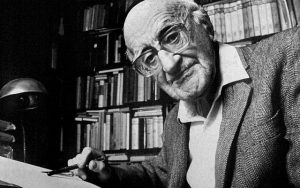
Leibowitz’s thought revolves around three fundamental notions : the people, land and state. This trichotomy is traditional and results from the nature of things.
Regarding ethnic Judaism, Leibovitz defines it as an imaginary fact of an immutable Judaism common to all Jews albeit in an unconscious form based on an abuse, that of considering as a Jew the one who does not arise as such based on a single thought. This inconsistency is based on a brutal and indeterminate fact insofar as it is based on an ethnic Judaism developed above all for a specific audience away from the yoke of Torah and mitzvot. Ethnic Judaism thus appears, in its statute, as a pursuit mimetic of the world of existence of the masters which ends by occupation of their place in the system of political positions, the structure of which remains unstable. Leibovitz was, above all, a great theorist of the “lishmah” faith, that is to say “for itself”, unconditioned or absolute, because for our master: “man has a conscience and is the bearer of this will creating values which transcends any empirical determination ” From this double criticism is born the demand for free thought, an autonomous debate that is no longer a distant appendix of Judeoethnic debates who directly confront the Jews with each other, thus creating within the people a human environment in which and through which can be posed the most difficult theoretical problems. So for him, no “law of nature” can deprive the individual of the (formidable) responsibility to choose according to or against the course of the latter. Leibowitz often said: “Knowledge is not binding” and any decision that man takes is irrational – in the sense of unfounded reason. Intelligence is what is, never what should be and which falls under “values”
His personal itinerary as well as what that the sentences retained in fine suggest to us the rigor inciting us to pro share knowledge and discourse on the practice of Torah by inviting us bit by bit the enchanted rituals of self-concealment. Finally for Leibowitz, the question of knowing whether or not we have a Judaism, must therefore be resolutely subordinate to impartial examination and objective judgment of the intrinsic value of the Torah for ethnic Judaism in fact destroys any possibility of dialogue and agreement among Jews.
